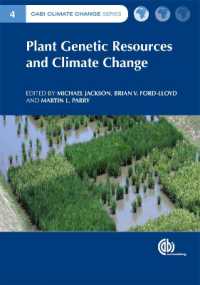- ホーム
- > 洋書
- > 英文書
- > Business / Economics
Full Description
The Covid-19 pandemic triggered an unprecedented shift to remote work, made possible by a vast array of technologies. While the frequency of remote work has decreased post-pandemic, many workers and organizations are now embracing remote and hybrid work options. Technologies that proved beneficial during the pandemic continue to be used, and the explosion of AI across industries has left many wondering about the future of work and society.
Meaningful Work in a Post-Covid Age: The Impact of New Technologies presents examples of how technology can enhance efficiency and effectiveness in education, industry, and healthcare when used to support organizational stakeholders. However, it also cautions that we must consider the long-term impact of technology on human well-being. The widespread use of new technologies has resulted in lasting shifts in organizational and worker mindsets about what is considered normal, appropriate, and desirable in how and where work is performed. These changes have also impacted how meaningful work is experienced.
The book addresses the underlying concern about whether the pervasive use of technology will result in net benefits or losses to society. Technology that focuses primarily on efficiency at the expense of relational and creative needs can detract from the meaningfulness of life and work, leading to worker unrest and alienation, and potentially impacting the physical and mental health of the global population.
Meaningful Work in a Post-Covid Age presents models and tools to help leaders, decision-makers, and workers navigate their organizations and careers to find meaningful work amidst the accelerating growth of new technologies.
Contents
Chapter 1. Meaningful Work and Technology: Opportunities and Challenges; Sharlene Buszka
Chapter 2. A Conceptual Framework for Meaningful Work: The Quest for Purpose in a Rapidly Evolving Technological Landscape; Michael P. Lillis
Chapter 3. Personal Narratives of Meaning Within the Grand Narrative of Technology; Timothy Ewest
Chapter 4.Remote Work and the Loneliness Epidemic: Is There a Connection?; Sharlene Buszka
Chapter 5. Using Technology to Meet the Needs of K-12 Students, Parents, and Teachers During the COVID-19 Pandemic and Beyond; Ashlee Hover and Tiffany Wilson
Chapter 6. Artificial Intelligence in Education: Transforming Learning and Teaching in the Post-Covid Era; Brian Graham
Chapter 7. Faculty Perceptions of AI: A Case Study in Higher Education; Hella R.Jacob, Devon Cozad ,and Kelly Castle
Chapter 8. Technology Use Enhances Meaningful Work; Carol Bartlo
Chapter 9. Hope for Higher Education on the Edge: A Case Study in Lean Transformation Through the Change Kaleidoscope; Joshua D. Reichard
Chapter 10. The Impact of Covid-19 on Technology, Interprofessional Collaboration, and Operations within Home Health Care; Michael Seils and Thao Nguyen
Chapter 11. Increased Use of Remote Work Technologies: Towards Greater Control of Employees? A Case Study on Cameras; Caroline Diard, Nicolas Dufour, and Aaron Joyal
Chapter 12. Finding Balance in the Digital Age: Employee Strategies for Digital Well-Being; Alice Verlinden, Elfi Baillien ,Lore Geldof, and Marijke Verbruggen








